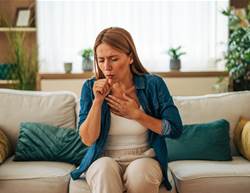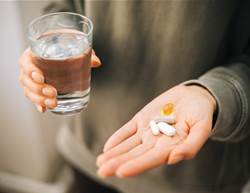Up to 80% of women develop fibroids in their uterus by the time they’re 50.
Learning that fibroids are non-cancerous growths in the uterus might leave you thinking ‘heck, even if I’ve got one, what’s the big deal’? But the effects of fibroids, and other uterine growths like polyps, can be significant.
For starters, both fibroids and polyps are a common cause of heavy menstrual bleeding, or HMB. Something that affects one in four women who get their period, HMB can not only leave you feeling exhausted, it can put a serious dent in your quality of life, too.
“The trouble is, when it comes to periods, women often aren’t sure what’s ‘normal’,” says obstetrician and gynaecologist Dr Bevan Brown, co-medical director of Sydney Fibroid Clinic and a clinical senior lecturer with ANU.
“If a woman comes to me and says she’s regularly passing clots with her period, then she’s bleeding abnormally heavy. If a woman comes to me and says she feels washed out after her period and has to take iron tablets or her GP has given her an iron infusion, she’s bleeding unusually heavily.”
Other physical signs of HMB include having to change your pad or tampon every hour or getting up during the night to change it, or periods that last for more than seven or eight days.
“A woman’s lot is not to suffer like this, that’s not right,” says Dr Brown, “particularly when there are treatments available for heavy menstrual bleeding, including when it’s caused by fibroids or polyps, that are so effective and require minimum downtime.”
The other warning signs of fibroids
As many as one in two women who has a fibroid will develop symptoms as a result. Heavy menstrual bleeding is the most common symptom, but it’s not the only one.
If you answer ‘yes’ to any of the following, it may also be a warning sign of fibroids.
- Are your periods painful?
- Do you experience pain during sex?
- Does your lower abdomen feel swollen all the time?
- Do you have heaviness or pressure in your back, bowel or bladder?
- Does it feel like you can’t empty your bladder or bowel completely when you go to the toilet?
- Do you need to wee more frequently than usual?
On the other hand, in addition to HMB, symptoms of uterine polyps include bleeding between periods, bleeding after menopause and irregular menstrual bleeding, for example when periods are frequently unpredictable in terms of either length or heaviness.
Both fibroids and polyps can also cause infertility.
When to seek help
Dr Bevan says that if you’re experiencing any of the symptoms listed above, make an appointment with your GP.
“Women don’t have to live with this, but unfortunately one of the biggest reasons women do put up with symptoms is because they’re terrified they’re looking down the barrel of a hysterectomy as their only treatment choice or that treatment will require weeks and weeks of recovery time. These days, that’s so far from the truth.
“When it comes to fibroids and polyps, there are minimally invasive treatments available that are safe and quick and that stop the immediate problem, which is often the heavy bleeding, very easily and effectively.
“Now, women can be in and out of hospital usually on the same day, and with very little recovery time, too, so that they’re back doing the things they want to do and being the person they want to be, in no time.”
To learn more about fibroids, polyps and heavy menstrual bleeding as well as the treatment options that are available, visit Wear White Again.
This article was created in association with one of our partners. Prevention only works with brands we believe in and that share our vision to provide science-backed content you can trust.










